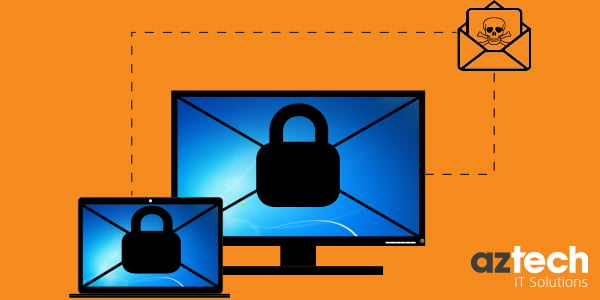With less than a year left before Microsoft ends their support of Windows 7, it’s time to decide what you want to do next. If you choose not to upgrade to Windows 10, you will open yourself and your business up to more security risks, due to there being no more software updates, security patches or technical support.
If you haven’t already, read part one in this series about what exactly end of life/end of support means for Windows 7 users.
What are the risks for your business?
Here are some of the business risk for keeping outdated windows:
1. Cyberattacks
Outdated operating systems are prime targets for hackers and data thieves, as unpatched software allows cyber criminals time to find weaknesses in the code, such as when Windows XP lost support in 2014, it wasn't long before exploitation of the final version of the platform became widespread.
Therefore, as no patches will be released, you will be at a greater risk of becoming a victim of cybercrime.
The 2017 WannaCry Ransomware used this type of vulnerability to their advantage, and even after Microsoft had released a patch to prevent this flaw being exploited, users who had not updated became victims, causing chaos for many businesses, including the NHS.
You may think that upgrading your operating system isn’t crucial in preventing a cyberattack, but it is an essential step you need to take to future-proof your business and PC infrastructure.
2. Unsupported Software
As we saw with Windows XP, when Microsoft ends support for an operating system, it signals other software to stop supporting older versions of Windows. Therefore, if you continue to use Windows 7 after January 2020, the latest versions of your daily applications, such as Internet Explorer, Google Chrome, email, and even your anti-virus may not be compatible with your PC anymore. As a result, this could open you up to security risks, as your operating system will be out-of-date as well as your applications.
3. Compliance
After January 14th 2020, Microsoft will not take responsibility for any security breaches from Windows 7. New malware is being developed daily, and in this modern age, it is spreading faster than ever and becoming harder to detect.
‘Under the GDPR, breach notifications are now mandatory in all member states where a data breach is likely to “result in a risk for the rights and freedoms of individuals”. This must be done within 72 hours of first having become aware of the breach. Data processors are also required to notify their customers, the controllers, “without undue delay” after first becoming aware of a data breach.’
If you are found to be in breach of GDPR, you can be fined up to 4% of your annual global turnover or €20 Million (whichever is greater).
4. No Technical Support
You'll no longer be able to contact Microsoft regarding support on Sever 2008-related problems, even if it's business-critical or causing major downtime.
Users will not be able to restore their system or recover any data or applications that are stored in the server.
5. Risk to third Party
If you decide not to update, you could become a risk to 3rd party organisations you share data with.
If you manage critical data for another business and access their network using an outdated browser, you could inadvertently expose them (or their customers’) data to risk, and vice versa.
Having out-of-date software makes you an easier target, but it also puts you and the companies you work with at risk, which could result in you losing business.
6. No Benefits
Without updating to Windows 10, you won't be able to benefit and take advantage of new IT infrastructure and application developments, management tools or cloud options, allowing your competitors to take the advantage.
How can aztech help you?
With more than 90% of consumers saying they would consider taking their business elsewhere if a company had outdated technology, 61% of consumers thinking an SMB is outdated if the company is still using a 5-10-year-old operating system and 49% of consumers never returning to a business if they’ve heard they’ve been hacked; It’s vital for the future of your business to keep your software up-to-date.
We can help by upgrading your systems to Windows 10 and Office 365, transforming your business and preparing you for the future. Windows 10 has a wide range of benefits to businesses, including improved security and ease of data backup to the cloud, ensuring your company can continue, even after a disaster.
Get in touch to find out more and see if your PCs are compatible to upgrade to Windows 10.

-1.png?width=552&height=678&name=text-image%20module%20desktop%20(4)-1.png)


.png?width=2000&name=Case%20study%20(21).png)


-2.png?width=422&height=591&name=text%20image%20tablet%20(31)-2.png)








